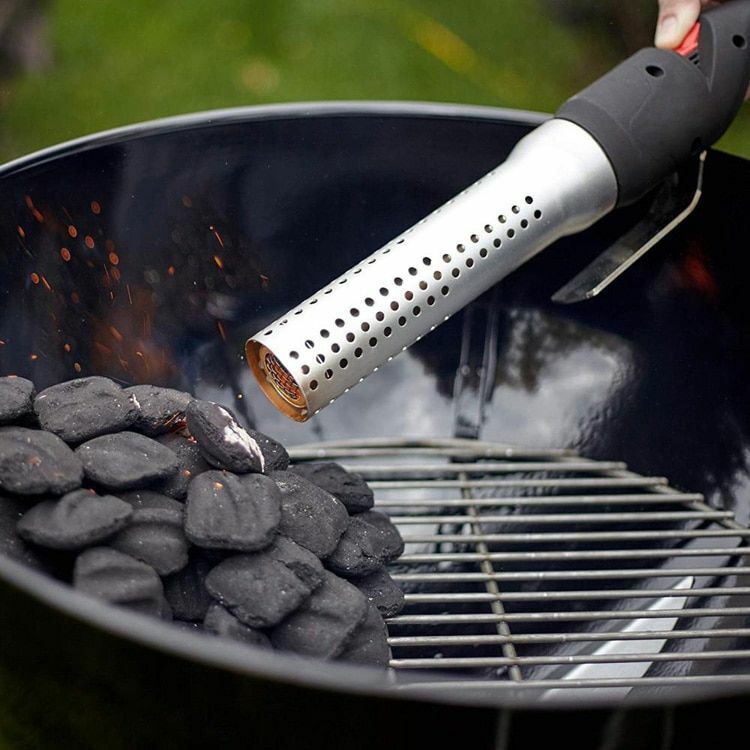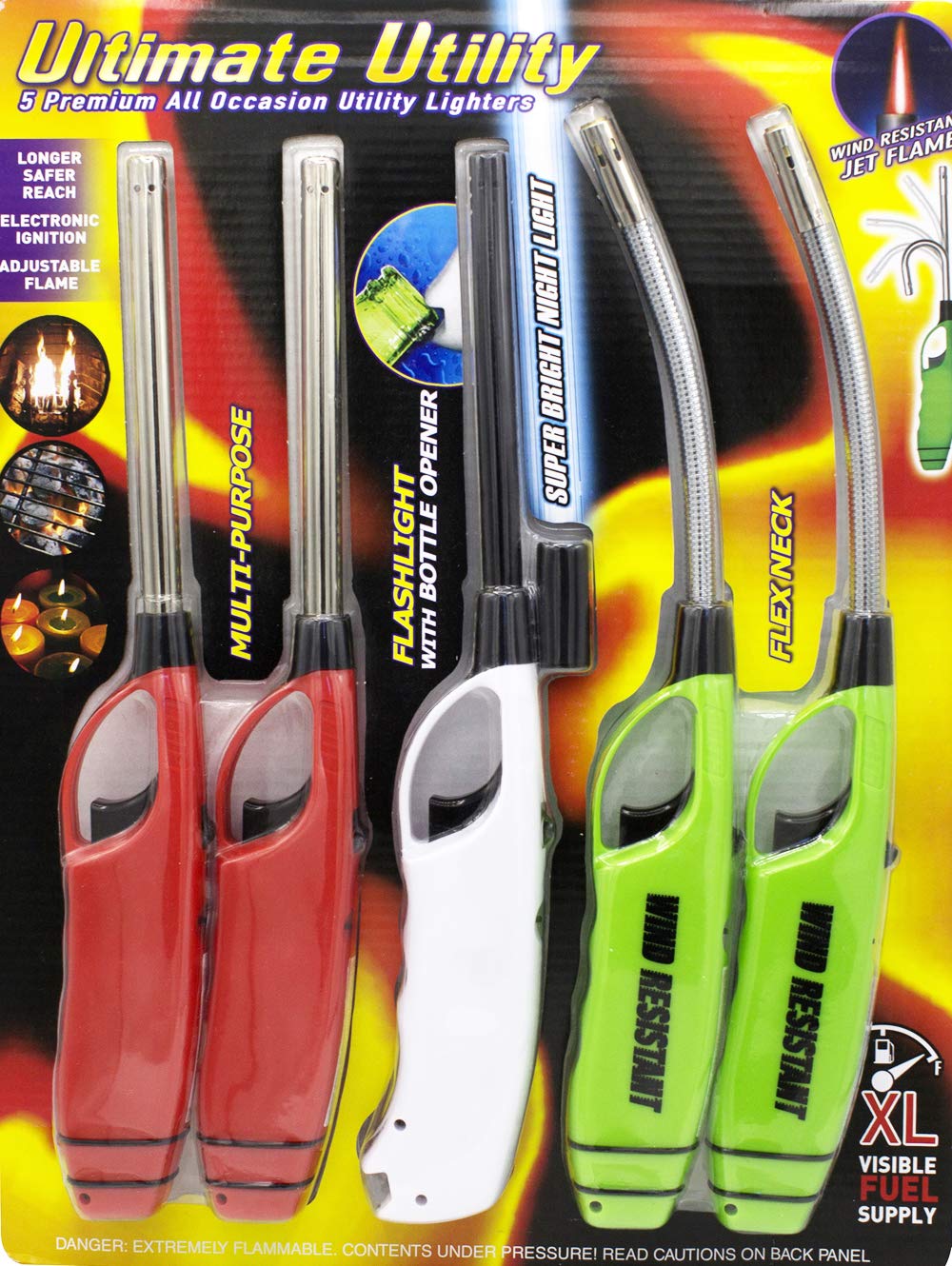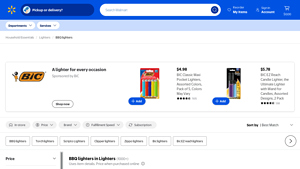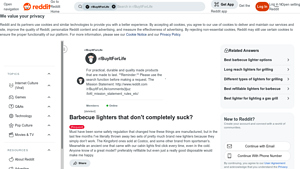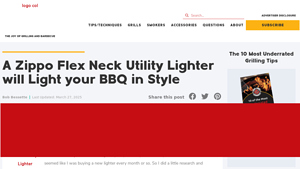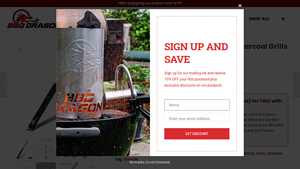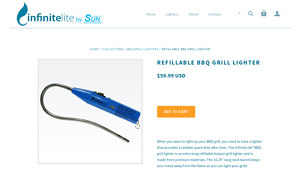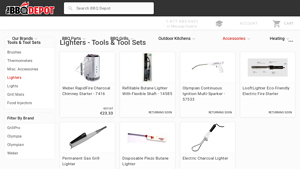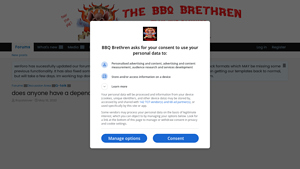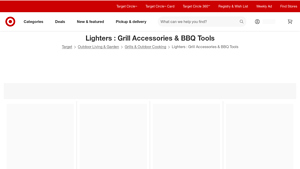Lighter For Bbq Grill Guide: Type,Cost,Material…
Introduction: Navigating the Global Market for lighter for bbq grill
In the competitive landscape of the BBQ grill accessories market, sourcing high-quality lighters is a pivotal challenge for B2B buyers. Whether catering to restaurants, outdoor events, or retail outlets, understanding the nuances of BBQ lighter options is crucial for ensuring customer satisfaction and operational efficiency. This comprehensive guide delves into the diverse types of BBQ lighters available, their specific applications, and the critical factors to consider when evaluating suppliers.
International buyers from regions such as Africa, South America, the Middle East, and Europe, including countries like Saudi Arabia and Germany, will find actionable insights tailored to their unique market dynamics. Key considerations such as supplier vetting processes, cost analysis, and compliance with local regulations are thoroughly addressed, empowering businesses to make informed purchasing decisions.
By leveraging this guide, B2B buyers can navigate the complexities of the global market for BBQ lighters with confidence, ensuring they select products that not only meet quality standards but also align with their business goals. With a focus on practical advice and strategic insights, this resource serves as an essential tool for enhancing procurement processes and ultimately driving business success in the outdoor cooking sector.
Understanding lighter for bbq grill Types and Variations
| Type Name | Key Distinguishing Features | Primary B2B Applications | Brief Pros & Cons for Buyers |
|---|---|---|---|
| Butane Torch Lighter | High heat output, adjustable flame, refillable | Restaurants, catering services | Pros: Efficient for high-temperature grilling. Cons: Requires fuel refills and can be pricey. |
| Electric Grill Lighter | Battery-operated, safe, and easy to use | Food trucks, outdoor events | Pros: No fuel needed, safe for indoor use. Cons: Limited by battery life and charging needs. |
| Flexible Neck Lighter | Long, flexible neck for hard-to-reach areas | Home kitchens, commercial kitchens | Pros: Versatile and user-friendly. Cons: May not be as durable as other types. |
| Charcoal Lighter Fluid | Liquid accelerant for quick ignition | Charcoal grilling businesses | Pros: Fast ignition for charcoal. Cons: Requires careful handling and storage. |
| Disposable Grill Lighter | Single-use, compact design, often inexpensive | Outdoor events, camping supplies retailers | Pros: Convenient and low-cost. Cons: Not environmentally friendly and limited usage. |
What Are the Characteristics and Suitability of Butane Torch Lighters for B2B Buyers?
Butane torch lighters are renowned for their high heat output and adjustable flame, making them ideal for professional grilling applications. Their refillable nature allows for continued use, which is a significant consideration for businesses that require consistent performance, such as restaurants and catering services. B2B buyers should assess the cost-effectiveness of refills versus the initial investment, as well as the lighter’s durability in high-demand environments.
How Do Electric Grill Lighters Serve the Needs of Businesses?
Electric grill lighters are battery-operated and provide a safe, user-friendly option for igniting grills without the need for flammable liquids. This feature is particularly beneficial for food trucks and outdoor event services where safety and ease of use are paramount. When considering electric lighters, B2B buyers must evaluate the longevity of the battery life and the availability of charging solutions to ensure uninterrupted operation.
Why Choose Flexible Neck Lighters for Difficult Grilling Scenarios?
Flexible neck lighters are designed with a long, adaptable neck that allows users to reach difficult areas, making them suitable for both home and commercial kitchens. Their versatility is a selling point for B2B buyers, as they can be used in various settings, from residential barbecue events to large-scale food production. However, businesses should consider the lighter’s build quality, as some models may not withstand heavy use.
What Are the Benefits of Using Charcoal Lighter Fluid in Commercial Grilling?
Charcoal lighter fluid provides a quick ignition solution for charcoal grilling, making it a popular choice among businesses that focus on traditional grilling methods. Its rapid effectiveness is ideal for establishments that need to serve customers quickly. However, B2B buyers must be aware of safety protocols for handling and storing flammable liquids to prevent accidents and ensure compliance with local regulations.
Are Disposable Grill Lighters a Viable Option for B2B Buyers?
Disposable grill lighters offer a compact and cost-effective solution for businesses that require a quick and easy lighting option. Their single-use nature makes them convenient for outdoor events and camping supplies retailers. However, B2B buyers should consider the environmental impact of disposable products and the potential long-term cost savings of investing in reusable options.
Key Industrial Applications of lighter for bbq grill
| Industry/Sector | Specific Application of lighter for bbq grill | Value/Benefit for the Business | Key Sourcing Considerations for this Application |
|---|---|---|---|
| Food Service | Lighting commercial grills for outdoor catering | Ensures quick and reliable ignition for food prep | Durability, refillable options, safety features |
| Hospitality | BBQ events and outdoor dining experiences | Enhances guest satisfaction with efficient service | Weather resistance, ease of use, aesthetic design |
| Retail | Selling to consumers for home grilling | Attracts customers looking for reliable grilling tools | Brand reputation, price competitiveness, safety compliance |
| Construction | Using lighters for temporary heating solutions | Provides an efficient solution for heating tasks | Compliance with safety standards, fuel type options |
| Event Management | Facilitating BBQ parties and outdoor events | Streamlines event setup and enhances guest experience | Portability, ease of operation, refill capacity |
How is ‘lighter for BBQ grill’ utilized in the food service industry?
In the food service sector, lighters are crucial for lighting commercial grills used in outdoor catering. They provide a quick and reliable ignition source, essential for maintaining the pace of food preparation during busy service hours. Buyers in this sector often prioritize durability and safety features, such as child-resistant mechanisms, to ensure compliance with health regulations. Additionally, refillable options are favored to reduce waste and ongoing costs, particularly in regions where disposable lighters may be less environmentally friendly.
What role do lighters play in the hospitality industry?
In the hospitality industry, particularly at BBQ events and outdoor dining venues, lighters are essential for creating a welcoming atmosphere. They facilitate the quick lighting of grills, allowing staff to serve guests promptly and efficiently. Buyers in this sector seek lighters that are weather-resistant and easy to use, as events may take place in various outdoor conditions. Aesthetically pleasing designs can also enhance the overall dining experience, making it important for suppliers to offer options that align with the venue’s branding.
How do retailers benefit from offering BBQ lighters?
Retailers that sell BBQ lighters cater to a growing consumer market interested in home grilling. By providing reliable and effective lighting solutions, they can attract customers looking for quality grilling tools. Key considerations for retailers include brand reputation and price competitiveness, as consumers are often drawn to trusted brands. Additionally, compliance with safety standards is critical, especially in regions where regulations may vary significantly, such as Europe and the Middle East.
In what ways are lighters used in the construction industry?
In the construction industry, lighters serve as a valuable tool for temporary heating solutions, especially in colder climates. They can be used to ignite heating equipment or to start fires for specific tasks, such as melting ice or thawing pipes. Buyers in this sector must consider compliance with safety standards and the type of fuel used in the lighters. Durability and ease of operation are also crucial, as construction sites can be harsh environments that demand reliable tools.
How do event management companies utilize lighters for BBQ events?
Event management companies frequently use lighters to facilitate BBQ parties and outdoor gatherings. A reliable lighter ensures a smooth setup process, allowing hosts to focus on guest experience rather than logistical challenges. Portability and ease of operation are vital for these applications, as event planners often need to transport equipment to various locations. Additionally, the refill capacity of lighters can be a significant factor, especially for large events where multiple lighting tasks are required.
3 Common User Pain Points for ‘lighter for bbq grill’ & Their Solutions
Scenario 1: Frequent Failures with Low-Quality Lighters
The Problem: Many B2B buyers, especially those in the hospitality and food service industries, often struggle with the reliability of low-quality BBQ lighters. These lighters may fail to ignite at critical moments, leading to frustrating delays in food preparation and service. This unreliability not only disrupts operations but can also tarnish a business’s reputation. For example, restaurants and catering services that depend on quick and efficient grilling may find themselves in a bind if their lighters fail, causing wasted time and potentially unhappy customers.
The Solution: To mitigate this issue, buyers should prioritize sourcing high-quality, durable lighters designed specifically for BBQ use. Look for lighters with features such as wind-resistant flames and refillable fuel options, like butane. Brands like Zippo or premium utility lighters have proven track records of reliability and longevity. It’s advisable to conduct thorough market research and read reviews to identify lighters that consistently perform well under various conditions. Establishing relationships with reputable suppliers can also help ensure a steady supply of quality products, reducing the frequency of replacements and enhancing operational efficiency.
Scenario 2: Safety Concerns in Commercial Settings
The Problem: Safety is a paramount concern for businesses that use BBQ lighters, particularly in commercial kitchens or outdoor event settings. There have been instances where lighters have malfunctioned, leading to accidental fires or injuries. This is especially concerning in environments where staff may not be trained extensively in handling flammable materials. Such incidents can lead to costly liabilities and damage to property, not to mention the risk to employee safety.
The Solution: To address safety concerns, it is crucial to invest in lighters equipped with child-resistant features and safety locks. Additionally, training staff on proper handling and storage of lighters can significantly reduce risks. Implementing standard operating procedures (SOPs) for using lighters, including guidelines on how to check for proper functioning before use, can help ensure safety in the workplace. Furthermore, consider lighters with ergonomic designs that are easy to handle, reducing the likelihood of accidents caused by fumbling or awkward use. Regular safety audits can also help identify and rectify potential hazards associated with lighter use.
Scenario 3: Inconsistent Performance in Varied Weather Conditions
The Problem: B2B buyers operating outdoor grilling services often face challenges with lighter performance in varying weather conditions. Wind, rain, or high humidity can render standard lighters ineffective, leading to delays and increased frustration for staff who rely on them for timely food preparation. For example, outdoor catering businesses may find that their lighters struggle to ignite in windy conditions, causing setbacks during events where timing is critical.
The Solution: To combat performance inconsistencies, buyers should seek out lighters specifically designed for outdoor use, featuring wind-resistant flames and adjustable settings. Options like flexible-neck lighters can make it easier to reach into tight spaces, ensuring that grills and smokers can be lit effectively, regardless of the environment. When procuring these products, it’s essential to request demonstrations or samples to assess their performance under various weather scenarios. Additionally, establishing a contingency plan that includes backup lighters or alternative ignition methods, such as electric starters, can provide peace of mind and ensure that operations run smoothly, no matter the conditions.
Strategic Material Selection Guide for lighter for bbq grill
What Are the Key Materials Used in BBQ Grill Lighters?
When selecting materials for BBQ grill lighters, several options are commonly utilized, each with distinct properties and applications. Understanding these materials is crucial for B2B buyers looking to source reliable and efficient grilling accessories.
How Does Plastic Perform as a Material for BBQ Grill Lighters?
Plastic is a prevalent material in the manufacturing of BBQ grill lighters, particularly for the casing and components. Its key properties include lightweight, resistance to corrosion, and good thermal insulation. However, plastics typically have lower temperature ratings, which may limit their performance under extreme conditions.
Pros of plastic include its low cost and ease of manufacturing, making it suitable for high-volume production. Conversely, the cons involve reduced durability compared to metals, as plastics can become brittle over time or degrade under UV exposure. For international buyers, especially in regions with high temperatures like the Middle East, it’s essential to consider the material’s thermal limits and potential for failure.
What Advantages Do Metal Materials Bring to BBQ Grill Lighters?
Metals, such as aluminum and stainless steel, are often used for their structural components due to their high temperature and pressure ratings. These materials exhibit excellent durability and corrosion resistance, making them ideal for outdoor use.
The advantages of metal lighters include their longevity and reliability, particularly in challenging weather conditions. However, the disadvantages include higher manufacturing complexity and costs. International buyers must also ensure compliance with local standards for metal products, such as ASTM or DIN, to meet safety and quality requirements.
How Do Butane and Propane Affect BBQ Grill Lighter Performance?
Butane and propane are the fuels commonly used in refillable BBQ lighters. Both gases have high energy content and are effective for igniting charcoal and wood. Key properties include low boiling points and high flammability, which are critical for quick ignition.
The pros of using these fuels include their efficiency and ease of refilling, making them practical for consumers. However, the cons relate to storage and transportation regulations, especially in regions like Europe, where strict compliance with safety standards is enforced. B2B buyers must be aware of the regulations governing the sale and distribution of these fuels in their respective markets.
What Role Does Glass Play in BBQ Lighter Design?
Glass is less common but can be utilized in specific components of BBQ lighters, such as the fuel reservoir. Its key properties include chemical resistance and the ability to withstand high temperatures. However, glass is fragile and can break easily, limiting its application.
The advantages of glass include its aesthetic appeal and non-reactive nature, which prevents contamination of the fuel. The disadvantages are primarily related to its fragility and potential safety hazards. For international buyers, especially those in regions prone to rough handling during transport, the use of glass should be carefully considered.
Summary Table of Material Selection for BBQ Grill Lighters
| Material | Typical Use Case for lighter for bbq grill | Key Advantage | Key Disadvantage/Limitation | Relative Cost (Low/Med/High) |
|---|---|---|---|---|
| Plastic | Casing and components | Lightweight and corrosion-resistant | Lower durability and thermal limits | Low |
| Metal | Structural components | High durability and corrosion resistance | Higher manufacturing complexity and cost | High |
| Butane/Propane | Fuel source | Efficient and easy to refill | Storage and transport regulations | Medium |
| Glass | Fuel reservoir | Aesthetic appeal and chemical resistance | Fragility and safety hazards | Medium |
In conclusion, selecting the right material for BBQ grill lighters involves understanding the specific properties and implications of each option. B2B buyers should consider factors such as durability, cost, and compliance with regional standards to make informed purchasing decisions.
In-depth Look: Manufacturing Processes and Quality Assurance for lighter for bbq grill
What Are the Key Stages in the Manufacturing Process of BBQ Grill Lighters?
The manufacturing process for BBQ grill lighters involves several critical stages to ensure quality, safety, and functionality. The main stages include material preparation, forming, assembly, and finishing.
How Is Material Prepared for BBQ Grill Lighters?
Material preparation begins with the selection of appropriate raw materials, typically metals for the body and plastics for safety features. Manufacturers may use stainless steel or aluminum for durability, while high-density polyethylene (HDPE) is often chosen for ergonomic handles. The materials undergo rigorous quality checks to ensure they meet specifications. These checks can include tensile strength tests and chemical composition analyses to confirm that the materials are suitable for producing reliable and long-lasting lighters.
What Forming Techniques Are Used in BBQ Lighter Manufacturing?
Forming techniques vary based on the design and materials used. Common processes include injection molding for plastic components and stamping or die-casting for metal parts. Injection molding allows for the creation of complex shapes, such as ergonomic grips and safety buttons, while metal stamping ensures that lighter casings are both lightweight and sturdy. Advanced techniques like CNC machining may also be employed for precision parts, ensuring that all components fit seamlessly during assembly.
How Are BBQ Grill Lighters Assembled?
Assembly is a critical stage in the manufacturing process, where all components come together to form a finished product. This process can be automated or manual, depending on the scale of production. In an automated assembly line, robots can handle repetitive tasks such as attaching the igniter to the lighter body, while manual assembly might be employed for quality-sensitive tasks, like installing child-resistant safety features. Quality control checkpoints, such as verifying the secure fit of components and ensuring proper alignment of ignition mechanisms, are crucial at this stage.
What Finishing Processes Are Applied to BBQ Grill Lighters?
Finishing processes enhance the aesthetic appeal and performance of BBQ grill lighters. These can include surface treatments like anodizing for metal parts, which adds a protective layer and improves corrosion resistance. Painting or applying a powder coat can also be performed to enhance appearance and provide additional protection. Finally, lighters undergo a thorough cleaning process to eliminate any residues from manufacturing, ensuring they are ready for retail.
How Is Quality Assurance Managed in BBQ Lighter Production?
Quality assurance (QA) is paramount in the production of BBQ grill lighters, ensuring that every unit meets international safety and quality standards. Manufacturers typically adhere to recognized standards such as ISO 9001, which sets out criteria for a quality management system. Compliance with these standards helps manufacturers maintain consistency and improve customer satisfaction.
What International Standards Are Relevant for BBQ Grill Lighters?
Beyond ISO 9001, BBQ grill lighter manufacturers may also comply with industry-specific standards such as CE marking for products sold in Europe, which indicates conformity with health, safety, and environmental protection standards. Additionally, certifications like API (American Petroleum Institute) may be required for lighters designed to use specific types of fuel. B2B buyers should inquire about these certifications to ensure compliance with local regulations in their respective markets.
What Are the Key Quality Control Checkpoints in BBQ Lighter Manufacturing?
Quality control (QC) involves several checkpoints throughout the manufacturing process, including:
-
Incoming Quality Control (IQC): This stage assesses raw materials before they enter production. Suppliers must provide documentation proving that materials meet required specifications.
-
In-Process Quality Control (IPQC): This involves monitoring the manufacturing process to detect defects early. Techniques like statistical process control (SPC) can be employed to analyze production data in real-time.
-
Final Quality Control (FQC): Before products are packaged, a final inspection is conducted to verify that they meet all quality standards. This may include functional testing of lighters to ensure they ignite correctly and safety checks for features like child resistance.
How Can B2B Buyers Verify Supplier Quality Control Practices?
B2B buyers can take several steps to verify the quality control practices of their suppliers. Conducting audits is one of the most effective methods. Buyers can request to visit manufacturing facilities to observe processes and quality checks in action. During these audits, buyers should evaluate the supplier’s adherence to international standards, the effectiveness of their QA processes, and their documentation practices.
What Documentation Should B2B Buyers Request from Suppliers?
Buyers should request quality assurance documentation, including:
-
Certificates of Compliance: Proof that products meet relevant international and regional standards.
-
Quality Control Reports: Detailed reports on testing results and QC processes can provide insights into the reliability of the production.
-
Third-party Inspection Reports: Independent inspections can offer an unbiased view of the supplier’s quality practices. Buyers may consider hiring third-party agencies to conduct these inspections before placing bulk orders.
What Are the Specific Quality Control Nuances for International B2B Buyers?
International B2B buyers, particularly from regions like Africa, South America, the Middle East, and Europe, should be aware of specific nuances in quality control. These can include:
-
Cultural Differences: Understanding local manufacturing practices and standards can aid in better communication with suppliers.
-
Regulatory Requirements: Different regions may have unique regulations for safety and environmental impact. Buyers should familiarize themselves with these requirements to ensure compliance.
-
Logistics and Supply Chain Considerations: Quality control does not end at manufacturing; it extends to packaging and shipping. Buyers should ensure that lighters are packaged securely to avoid damage during transport, and that shipping practices comply with international regulations for hazardous materials.
By understanding the manufacturing processes and quality assurance protocols associated with BBQ grill lighters, B2B buyers can make informed decisions, ensuring they source reliable, high-quality products that meet both their business needs and regulatory requirements.
Practical Sourcing Guide: A Step-by-Step Checklist for ‘lighter for bbq grill’
This guide is designed to assist B2B buyers in the effective procurement of lighters specifically tailored for BBQ grills. With various options available in the market, understanding the key factors in sourcing can streamline the purchasing process, ensuring you acquire products that meet your operational needs while delivering value.
Step 1: Define Your Technical Specifications
Establishing clear technical specifications is fundamental to sourcing the right BBQ grill lighters. Consider factors such as the fuel type (butane, lighter fluid, etc.), ignition method (manual, electric), and safety features (child-resistant mechanisms). This clarity helps in narrowing down potential suppliers who can meet your precise requirements.
Step 2: Research Market Trends and Regulations
Understanding the market dynamics and regulatory frameworks is crucial, especially in diverse regions such as Africa, South America, the Middle East, and Europe. Stay informed about safety standards, import regulations, and environmental considerations that may affect product selection. This knowledge aids in compliance and ensures that you are sourcing lighters that are not only effective but also legal to use in your target markets.
Step 3: Evaluate Potential Suppliers
Before committing to a supplier, it’s essential to conduct a thorough evaluation. Request company profiles, product certifications, and references from existing clients in similar industries. Look for suppliers with a proven track record in delivering quality products and who understand the specific needs of the BBQ grill market.
Step 4: Request Samples and Test Products
Always request samples before making a bulk purchase. Testing the lighters in real-world conditions can reveal their performance, durability, and ease of use. Evaluate features such as flame consistency, refillability, and safety mechanisms, ensuring they align with your business standards and customer expectations.
Step 5: Assess Pricing and Terms of Sale
Review the pricing structures and terms of sale from various suppliers. Look for competitive pricing while considering the total cost of ownership, which includes shipping, handling, and potential import taxes. Negotiate terms that provide flexibility in order quantities and payment options, which can be beneficial for managing cash flow.
Step 6: Verify Supplier Certifications
Ensure that your chosen supplier holds necessary certifications that comply with international safety standards. Certifications such as ISO or specific regional compliance marks can indicate a supplier’s commitment to quality and safety. This step not only mitigates risk but also enhances your brand’s reputation by ensuring that you provide safe and reliable products.
Step 7: Establish a Long-Term Relationship
Once you have successfully sourced your BBQ grill lighters, focus on building a long-term relationship with your supplier. Consistent communication and feedback can lead to better pricing, priority service, and access to new products. A reliable partnership can ultimately result in enhanced operational efficiency and customer satisfaction.
Following this checklist will empower you to make informed decisions while sourcing BBQ grill lighters, ensuring that your procurement process is both efficient and effective.
Comprehensive Cost and Pricing Analysis for lighter for bbq grill Sourcing
What Are the Key Cost Components in BBQ Grill Lighter Production?
Understanding the cost structure of BBQ grill lighters is crucial for B2B buyers. The primary components include:
-
Materials: The choice of materials significantly affects the cost. Common materials include plastic for the body and metal for internal mechanisms. Higher quality materials that resist heat and wear can increase production costs but may enhance the product’s durability and appeal.
-
Labor: Labor costs can vary widely depending on the manufacturing location. Regions with lower labor costs, such as parts of Asia, may offer competitive pricing. However, suppliers in Europe or North America may charge more due to higher wage standards, reflecting on the final product cost.
-
Manufacturing Overhead: This includes expenses related to utilities, rent, and administrative costs. Efficient production processes can lower overhead costs, impacting overall pricing.
-
Tooling: Initial tooling costs for molds and machinery can be substantial. These costs are often amortized over a larger production volume, meaning that larger orders can benefit from reduced per-unit costs.
-
Quality Control (QC): Implementing stringent QC measures ensures product reliability but can add to the overall cost. Certifications such as ISO or safety standards compliance may also incur additional expenses.
-
Logistics: Shipping costs, which can fluctuate based on fuel prices and shipping routes, play a significant role in the total cost. For international buyers, understanding Incoterms is essential to determine who bears these costs.
-
Margin: Supplier margins can vary based on market demand and competition. Understanding the competitive landscape can help buyers negotiate better prices.
How Do Price Influencers Affect BBQ Grill Lighter Costs?
Several factors influence the pricing of BBQ grill lighters, particularly in the B2B context:
-
Volume and Minimum Order Quantity (MOQ): Bulk purchases typically lead to lower per-unit costs. Suppliers often have MOQs that can affect pricing strategy, with larger orders incentivizing discounts.
-
Specifications and Customization: Custom features, such as unique designs or branding, can significantly increase costs. Buyers should assess whether customization is necessary or if off-the-shelf products suffice.
-
Materials and Quality Certifications: Premium materials or those that meet specific safety certifications can elevate costs. Buyers should weigh the benefits of higher quality against their budget constraints.
-
Supplier Factors: The supplier’s reputation, production capabilities, and location can affect pricing. Established suppliers with a track record of reliability may charge a premium.
-
Incoterms: Understanding Incoterms is critical for international transactions. They define the responsibilities of buyers and sellers regarding shipping costs, insurance, and risks, influencing the total landed cost of goods.
What Buyer Tips Can Help Negotiate Better Prices for BBQ Grill Lighters?
B2B buyers can employ various strategies to secure favorable pricing:
-
Negotiation: Engage suppliers in discussions about pricing and terms. Highlighting potential long-term relationships may encourage them to offer better deals.
-
Cost-Efficiency: Analyze the Total Cost of Ownership (TCO), which includes purchase price, shipping, and maintenance costs. This broader view can uncover hidden costs and inform purchasing decisions.
-
Pricing Nuances for International Buyers: For buyers in regions like Africa, South America, and the Middle East, understanding local market dynamics and economic conditions can provide leverage during negotiations. Currency fluctuations and import duties also play a critical role in pricing.
-
Research and Comparison: Conduct thorough market research to compare prices across various suppliers. This not only informs about average market rates but also strengthens negotiation positions.
Conclusion
Navigating the costs and pricing structures of BBQ grill lighters requires a detailed understanding of various components and influences. By leveraging this knowledge, B2B buyers can make informed decisions that enhance their procurement strategies and ultimately lead to more profitable outcomes. Always remember that prices can vary significantly based on the factors discussed, so it’s essential to consider all aspects before finalizing any purchase agreements.
Alternatives Analysis: Comparing lighter for bbq grill With Other Solutions
Exploring Alternatives to Lighters for BBQ Grilling
When it comes to lighting BBQ grills, lighters are a popular choice, but they are not the only solution available. Understanding the alternatives can help businesses make informed decisions based on their specific needs and operational contexts. Below, we compare lighters for BBQ grills with two alternative solutions: electric starters and fire starter cubes.
| Comparison Aspect | Lighter For BBQ Grill | Electric Starter | Fire Starter Cubes |
|---|---|---|---|
| Performance | Quick ignition, portable, ideal for outdoor use | Efficient for larger grills, requires a power source | Reliable ignition for charcoal and wood |
| Cost | Low initial cost, refillable options available | Higher upfront cost, but reusable | Affordable, usually sold in packs |
| Ease of Implementation | Simple to use, no setup required | Requires access to electricity | Easy to use, requires minimal preparation |
| Maintenance | Minimal; occasional refilling | Moderate; requires cleaning and care | Low; just store properly |
| Best Use Case | Ideal for casual grilling and portability | Best for commercial setups or frequent use | Excellent for camping or emergency situations |
What Are the Advantages and Disadvantages of Electric Starters?
Electric starters are a viable alternative to traditional lighters, particularly for businesses that operate larger grills or need a consistent ignition source. These devices utilize electrical heating elements to ignite charcoal or wood, making them extremely effective. However, they do have some drawbacks. The main disadvantage is their dependence on a power source, which can limit their use in outdoor settings without electricity. Additionally, while they are efficient and can be reused many times, the initial investment is higher compared to a simple lighter.
How Do Fire Starter Cubes Compare?
Fire starter cubes are another effective solution for igniting BBQ grills, especially for charcoal users. They are made from compressed materials that light easily and burn long enough to ignite the grill. The main advantages of fire starter cubes include their affordability and ease of use; they require no tools or accessories. However, their effectiveness can be influenced by weather conditions, and they may not be as portable as lighters, particularly in bulk. They are also less convenient for quick lighting needs compared to lighters or electric starters.
Making the Right Choice for Your BBQ Needs
Choosing the right ignition solution for BBQ grilling ultimately depends on your specific requirements and operational context. For businesses focused on casual grilling or those that prioritize portability, lighters remain a strong choice due to their ease of use and low cost. On the other hand, electric starters are better suited for frequent, large-scale grilling where efficiency and consistency are paramount. Fire starter cubes offer a middle ground, ideal for situations where quick ignition is necessary but electricity is unavailable.
By evaluating the performance, cost, and practicality of each alternative, B2B buyers can make a more informed decision that aligns with their grilling needs and operational capabilities.
Essential Technical Properties and Trade Terminology for lighter for bbq grill
What Are the Essential Technical Properties for BBQ Grill Lighters?
When sourcing BBQ grill lighters, understanding their technical properties is crucial for ensuring product quality and performance. Here are the key specifications to consider:
-
Material Composition
The materials used in the construction of BBQ lighters significantly affect their durability and performance. Common materials include high-grade plastics for the body and metal for internal components. For B2B buyers, selecting lighters made from robust materials ensures longevity and resistance to wear and tear, which is vital for frequent use in grilling environments. -
Flame Type and Adjustability
BBQ lighters typically feature either a steady flame or a wind-resistant flame. Adjustable flame settings are also common, allowing users to control the intensity of the flame. This is particularly important for outdoor cooking scenarios where wind can extinguish weaker flames. Understanding flame properties ensures that the lighter will meet the specific needs of your target market, whether they are casual grillers or professional chefs. -
Refillability
Many modern BBQ lighters are designed to be refillable with butane or propane, extending their lifespan and reducing waste. For B2B buyers, this feature is attractive as it aligns with sustainability practices and cost-effectiveness. Providing refillable options can also enhance customer satisfaction and loyalty, as they represent a long-term investment for end-users. -
Safety Features
Safety mechanisms, such as child-resistant locks and secure ignition systems, are essential in BBQ lighters. These features prevent accidental ignition and enhance user safety, particularly in households with children. B2B purchasers should prioritize products that meet international safety standards, as this can mitigate liability risks and enhance brand reputation. -
Size and Ergonomics
The design and size of BBQ lighters can affect usability, especially when lighting hard-to-reach areas like deep grills or chimneys. A longer neck or ergonomic handle can improve user experience. Understanding the ergonomic needs of your target demographic can guide product selection and ensure customer satisfaction. -
Certification and Compliance
Certifications (such as ISO or CE) indicate that the lighter has met specific safety and performance standards. For international B2B buyers, ensuring compliance with local regulations is crucial to avoid legal issues and ensure product reliability.
What Are the Common Trade Terms Related to BBQ Grill Lighters?
Familiarity with industry jargon is essential for effective communication and negotiation in the B2B landscape. Here are some common terms:
-
OEM (Original Equipment Manufacturer)
This term refers to companies that produce parts or equipment that may be marketed by another manufacturer. Understanding OEM relationships is vital for buyers looking to customize products or create unique branding opportunities. -
MOQ (Minimum Order Quantity)
MOQ is the minimum number of units a supplier is willing to sell. This term is crucial for budget planning and inventory management. Buyers need to assess their demand accurately to negotiate favorable MOQs that align with their sales projections. -
RFQ (Request for Quotation)
An RFQ is a formal document issued by a buyer to solicit price quotes from suppliers. This process helps buyers compare costs and terms from multiple vendors, ensuring they secure the best deal. Effective use of RFQs can streamline procurement processes and enhance supplier relationships. -
Incoterms (International Commercial Terms)
Incoterms define the responsibilities of buyers and sellers in international shipping. They clarify who pays for shipping, insurance, and tariffs, which is critical for B2B transactions across borders. Understanding these terms helps buyers manage logistics and costs effectively. -
Lead Time
This term refers to the time taken from placing an order to receiving it. Understanding lead times is essential for inventory management and meeting customer demand. Buyers should always clarify lead times with suppliers to ensure timely product availability. -
Warranty and Guarantee
These terms refer to the promises made by manufacturers regarding product quality and support. A strong warranty can influence purchasing decisions, as it reflects the manufacturer’s confidence in their product. Buyers should look for clear warranty terms that protect their investment.
By grasping these essential technical properties and trade terms, B2B buyers can make informed decisions when sourcing BBQ grill lighters, ensuring they meet their operational needs and customer expectations.
Navigating Market Dynamics and Sourcing Trends in the lighter for bbq grill Sector
What Are the Current Market Trends Influencing the BBQ Grill Lighter Sector?
The global BBQ grill lighter market is experiencing dynamic shifts driven by consumer preferences, technological advancements, and environmental considerations. Key trends include the rise in demand for refillable and reusable lighters, particularly in regions like Europe and North America, where sustainability is a priority. Additionally, the popularity of outdoor cooking and grilling activities has surged, especially in Africa and South America, where cultural festivities often include BBQ gatherings. This trend is further fueled by the increasing availability of high-quality BBQ equipment and accessories.
Emerging technologies, such as electric lighters and those with wind-resistant features, are becoming increasingly popular among B2B buyers. These innovations not only enhance user experience but also align with the growing demand for safety and convenience. Furthermore, the integration of e-commerce platforms has made it easier for international buyers to source a diverse range of products quickly, streamlining the procurement process.
Market dynamics also show a regional variation, with Middle Eastern buyers leaning towards high-end, durable products that can withstand extreme conditions. In contrast, European and South American markets are more focused on affordability and functionality. Understanding these nuances is crucial for international B2B buyers seeking to optimize their sourcing strategies.
How Is Sustainability Impacting the Sourcing of BBQ Grill Lighters?
The importance of sustainability in the BBQ grill lighter sector cannot be overstated. As environmental concerns grow, B2B buyers are increasingly prioritizing ethical sourcing and sustainable practices in their procurement processes. This shift is driven by consumer demand for products that minimize environmental impact, urging manufacturers to adopt eco-friendly materials and production methods.
Buyers are now looking for BBQ lighters made from recyclable materials and those that have received green certifications. For instance, lighter products that utilize butane instead of traditional lighter fluids are preferred due to their lower environmental footprint. Additionally, companies that can demonstrate a commitment to ethical supply chains, such as fair labor practices and reduced carbon emissions, are likely to gain a competitive edge in the market.
Moreover, sustainability initiatives are not just about materials; they also encompass packaging. B2B buyers are increasingly favoring suppliers who utilize minimal and recyclable packaging to reduce waste. By aligning sourcing strategies with sustainability goals, businesses can enhance their brand reputation and meet the expectations of environmentally conscious consumers.
What Historical Developments Have Shaped the BBQ Grill Lighter Market?
The evolution of BBQ grill lighters can be traced back to their initial use in the mid-20th century when basic, disposable lighters dominated the market. Over the decades, advancements in technology have transformed these simple tools into versatile, durable products designed for longevity and efficiency. The introduction of refillable lighters in the 1980s marked a significant turning point, aligning with the early sustainability movements that emphasized waste reduction.
In the 1990s and 2000s, the demand for safety features led to innovations such as child-resistant mechanisms and ergonomic designs. As grilling culture expanded globally, particularly in regions like Africa and South America, manufacturers began to cater to diverse consumer preferences, resulting in a wider variety of products tailored to specific needs and environments. Today, the BBQ grill lighter market continues to evolve, driven by technological advancements and a growing emphasis on sustainability, reflecting broader shifts in consumer behavior and environmental responsibility.
Conclusion
Understanding the current market trends, sustainability imperatives, and historical context is essential for B2B buyers in the BBQ grill lighter sector. By staying informed and adapting to these dynamics, international buyers can strategically position themselves to meet the evolving needs of their customers while fostering sustainable practices that resonate with today’s environmentally conscious market.
Frequently Asked Questions (FAQs) for B2B Buyers of lighter for bbq grill
-
How do I select the right lighter for my BBQ grill business?
When choosing a lighter for your BBQ grill business, consider factors such as fuel type (butane, propane, or electric), safety features, and durability. Additionally, assess the design for ease of use, especially in outdoor conditions. It’s also vital to evaluate the lighter’s refillability and the availability of replacement parts. Conducting product tests and gathering feedback from customers can help identify the best options that meet their needs and enhance their grilling experience. -
What is the best type of lighter for outdoor BBQ grilling?
For outdoor BBQ grilling, a wind-resistant utility lighter is often the best choice. These lighters are designed to function effectively in various weather conditions, ensuring reliable ignition even in breezy environments. Look for options with a flexible neck for easy access to hard-to-reach areas, and consider refillable models to reduce long-term costs. Brands known for their durability and performance, such as Zippo or Bernzomatic, are highly recommended. -
What should I consider when vetting suppliers for BBQ lighters?
When vetting suppliers for BBQ lighters, assess their reputation, product quality, and compliance with international safety standards. Request samples to evaluate the lighters’ performance and durability. It’s also crucial to verify their production capacity, lead times, and ability to meet your specific requirements, including customization options. Check for certifications and customer reviews to ensure they are a reliable partner for your business needs. -
What are the typical minimum order quantities (MOQs) for BBQ lighters?
Minimum order quantities (MOQs) for BBQ lighters can vary significantly between suppliers. Generally, MOQs range from 500 to 5,000 units, depending on the manufacturer and the specific model. Some suppliers may offer lower MOQs for first-time orders or smaller businesses. It’s advisable to discuss your needs directly with potential suppliers to negotiate favorable terms that align with your business strategy. -
What payment terms should I expect when sourcing BBQ lighters internationally?
Payment terms for international sourcing of BBQ lighters typically include options like a letter of credit, advance payment, or payment upon delivery. Many suppliers require a deposit (often 30-50%) upon order confirmation, with the balance due before shipment. It’s essential to clarify payment terms upfront to avoid any misunderstandings and ensure a smooth transaction process. Consider using secure payment methods to protect your investment. -
How can I ensure quality assurance (QA) for BBQ lighters?
To ensure quality assurance (QA) for BBQ lighters, implement a rigorous inspection process that includes pre-production samples and in-line inspections during manufacturing. Collaborate with suppliers who have quality certifications, such as ISO 9001, to guarantee adherence to industry standards. Additionally, consider third-party quality audits or testing to validate product safety and performance before shipment. -
What logistics considerations should I keep in mind when importing BBQ lighters?
When importing BBQ lighters, consider logistics factors such as shipping methods, customs regulations, and import duties. Choose a reliable freight forwarder familiar with your destination’s regulations to facilitate smooth transportation. Ensure that all documentation, including bills of lading and customs declarations, is accurate to prevent delays. Additionally, factor in lead times for shipping and customs clearance when planning inventory levels. -
Can I customize BBQ lighters for my brand?
Yes, many suppliers offer customization options for BBQ lighters, allowing you to add your brand logo, specific colors, or unique designs. Customization can enhance your brand visibility and differentiate your products in a competitive market. Discuss your requirements with potential suppliers to understand their capabilities and any associated costs. Ensure to review samples of customized lighters before placing large orders to confirm quality and design accuracy.
Important Disclaimer & Terms of Use
⚠️ Important Disclaimer
The information provided in this guide, including content regarding manufacturers, technical specifications, and market analysis, is for informational and educational purposes only. It does not constitute professional procurement advice, financial advice, or legal advice.
While we have made every effort to ensure the accuracy and timeliness of the information, we are not responsible for any errors, omissions, or outdated information. Market conditions, company details, and technical standards are subject to change.
B2B buyers must conduct their own independent and thorough due diligence before making any purchasing decisions. This includes contacting suppliers directly, verifying certifications, requesting samples, and seeking professional consultation. The risk of relying on any information in this guide is borne solely by the reader.
Top 8 Lighter For Bbq Grill Manufacturers & Suppliers List
1. Scripto – BBQ Lighters
Domain: walmart.com
Registered: 1995 (30 years)
Introduction: This company, Scripto – BBQ Lighters, is a notable entity in the market. For specific product details, it is recommended to visit their website directly.
2. Kingsford – Barbecue Lighters
Domain: reddit.com
Registered: 2005 (20 years)
Introduction: The discussion revolves around barbecue lighters that are reliable and effective. Users express frustration with recent models, particularly mentioning Kingsford lighters from Costco as not working well. An older model that came with a cabin is noted for its reliability, igniting on the first click even in cold conditions. Recommendations include the Bernzomatic torch for its consistent performanc…
3. Zippo – Flex Neck Utility Lighter
Domain: lifewithgrilling.com
Registered: 2011 (14 years)
Introduction: Zippo Flex Neck Utility Lighter
– Color: Silver (Black is another option)
– Material: Durable Metal Construction
– Dimensions: 12″ long X 1″ wide
– Features:
– Wind-resistant dual flame technology
– Adjustable flame dial
– Flexible neck for hard-to-reach spots
– Refillable with butane (not included)
– Child-resistant safety button
– Folding metal loop for hanging
4. BBQ Dragon – USB Rechargeable Arc Lighter
Domain: bbqdragon.com
Registered: 2012 (13 years)
Introduction: USB Rechargeable Arc Lighter for Charcoal Grills and Gas Stoves
Price: $24.99
SKU: BBQD490
Features:
– USB rechargeable
– High-power plasma arc
– Flexible stainless steel gooseneck
– Windproof and butane-free
– 100’s of lights from a single charge
– No fumes or smells
– Overcharge protection and over-heating protection
– Auto power-off after 10 seconds
– 5 LED charge indicator lights
– Safety swit…
5. InfiniteLite – Refillable BBQ Grill Lighter
Domain: sun-lighters.com
Registered: 2014 (11 years)
Introduction: {‘product_name’: ‘Refillable BBQ Grill Lighter’, ‘brand’: ‘InfiniteLite’, ‘manufacturer’: ‘Sun Equipment Corporation’, ‘price’: ‘59.99 USD’, ‘length’: ‘16.25 inches’, ‘weight’: ‘0.6 lbs’, ‘features’: [‘Flexible 16.25″ barrel neck for safe distance from flame’, ‘Three functions: continuous spark, spark with flame, flame only’, ‘Patented and USA CPSC approved child-resistant switch’, ‘Easy one-thumb…
6. Weber – Refillable Butane Lighter With Flexible Shaft
Domain: thebbqdepot.com
Registered: 2000 (25 years)
Introduction: {“products”:[{“name”:”Refillable Butane Lighter With Flexible Shaft”,”part_number”:”14585″,”brand”:”Weber”,”price”:”$18.51″,”original_price”:”$25.67″},{“name”:”RapidFire Charcoal Chimney Starter”,”part_number”:”7416″,”brand”:”Weber”,”price”:”$24.99″,”original_price”:”$29.99″},{“name”:”Olympian Continuous Ignition Multi-Sparker”,”part_number”:”57533″,”brand”:”Olympian”,”price”:”$34.99″,”original_pr…
7. Kingsford – BBQ Lighters
Domain: bbq-brethren.com
Registered: 2003 (22 years)
Introduction: 1. Kingsford Lighters: Users report they are dependable and last a long time. Available at https://www.kingsford.com/products/kingsford-bbq-lighters/. 2. Scripto Torch Flame Lighter: Available in a pack at SAMS, includes 3 regular lighters and 1 torch lighter. 3. EverStart Mini Butane Torch: Known for reliability in windy conditions, available at Walmart. 4. Turbo Blue XXL Torch: Similar performan…
8. Ivation – 500W Electric Charcoal Starter
Domain: target.com
Registered: 1997 (28 years)
Introduction: This company, Ivation – 500W Electric Charcoal Starter, is a notable entity in the market. For specific product details, it is recommended to visit their website directly.
Strategic Sourcing Conclusion and Outlook for lighter for bbq grill
The strategic sourcing of BBQ lighters is pivotal for international buyers aiming to meet the diverse needs of their markets across Africa, South America, the Middle East, and Europe. Understanding the unique features of various lighter types, such as refillable options, wind-resistant capabilities, and ergonomic designs, can enhance product offerings and improve customer satisfaction. Furthermore, sourcing from reliable manufacturers ensures quality and consistency, crucial for establishing a trustworthy brand in competitive markets.
Leveraging strategic sourcing not only optimizes procurement costs but also strengthens supplier relationships, allowing for better negotiation terms and supply chain resilience. As global demand for outdoor cooking products continues to rise, now is the opportune moment for businesses to invest in high-quality BBQ lighters that align with consumer preferences for durability and functionality.
In conclusion, international B2B buyers should prioritize strategic sourcing as a vital component of their business strategy. By doing so, they can ensure a robust supply of innovative, reliable lighter products that cater to the evolving grilling culture. Seize this opportunity to enhance your product lineup and stay ahead of market trends—your customers will thank you for it.
